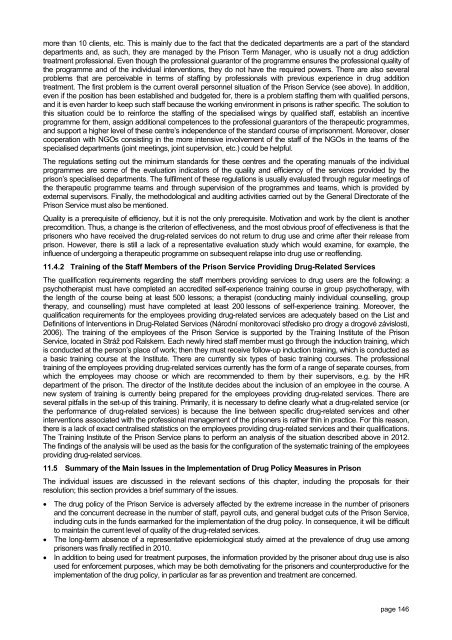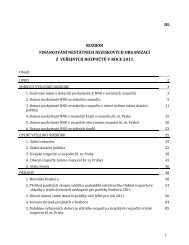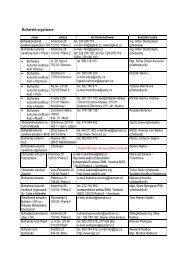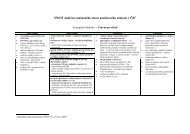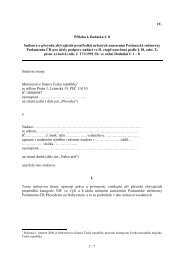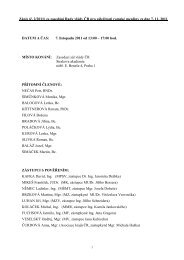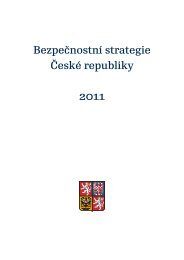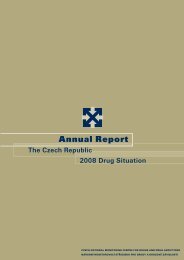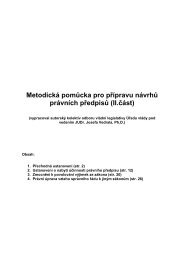The Czech Republic Annual Report 2010 Drug ... - Drogy-info.cz
The Czech Republic Annual Report 2010 Drug ... - Drogy-info.cz
The Czech Republic Annual Report 2010 Drug ... - Drogy-info.cz
Create successful ePaper yourself
Turn your PDF publications into a flip-book with our unique Google optimized e-Paper software.
more than 10 clients, etc. This is mainly due to the fact that the dedicated departments are a part of the standard<br />
departments and, as such, they are managed by the Prison Term Manager, who is usually not a drug addiction<br />
treatment professional. Even though the professional guarantor of the programme ensures the professional quality of<br />
the programme and of the individual interventions, they do not have the required powers. <strong>The</strong>re are also several<br />
problems that are perceivable in terms of staffing by professionals with previous experience in drug addition<br />
treatment. <strong>The</strong> first problem is the current overall personnel situation of the Prison Service (see above). In addition,<br />
even if the position has been established and budgeted for, there is a problem staffing them with qualified persons,<br />
and it is even harder to keep such staff because the working environment in prisons is rather specific. <strong>The</strong> solution to<br />
this situation could be to re<strong>info</strong>rce the staffing of the specialised wings by qualified staff, establish an incentive<br />
programme for them, assign additional competences to the professional guarantors of the therapeutic programmes,<br />
and support a higher level of these centre’s independence of the standard course of imprisonment. Moreover, closer<br />
cooperation with NGOs consisting in the more intensive involvement of the staff of the NGOs in the teams of the<br />
specialised departments (joint meetings, joint supervision, etc.) could be helpful.<br />
<strong>The</strong> regulations setting out the minimum standards for these centres and the operating manuals of the individual<br />
programmes are some of the evaluation indicators of the quality and efficiency of the services provided by the<br />
prison’s specialised departments. <strong>The</strong> fulfilment of these regulations is usually evaluated through regular meetings of<br />
the therapeutic programme teams and through supervision of the programmes and teams, which is provided by<br />
external supervisors. Finally, the methodological and auditing activities carried out by the General Directorate of the<br />
Prison Service must also be mentioned.<br />
Quality is a prerequisite of efficiency, but it is not the only prerequisite. Motivation and work by the client is another<br />
precomdition. Thus, a change is the criterion of effectiveness, and the most obvious proof of effectiveness is that the<br />
prisoners who have received the drug-related services do not return to drug use and crime after their release from<br />
prison. However, there is still a lack of a representative evaluation study which would examine, for example, the<br />
influence of undergoing a therapeutic programme on subsequent relapse into drug use or reoffending.<br />
11.4.2 Training of the Staff Members of the Prison Service Providing <strong>Drug</strong>-Related Services<br />
<strong>The</strong> qualification requirements regarding the staff members providing services to drug users are the following: a<br />
psychotherapist must have completed an accredited self-experience training course in group psychotherapy, with<br />
the length of the course being at least 500 lessons; a therapist (conducting mainly individual counselling, group<br />
therapy, and counselling) must have completed at least 200 lessons of self-experience training. Moreover, the<br />
qualification requirements for the employees providing drug-related services are adequately based on the List and<br />
Definitions of Interventions in <strong>Drug</strong>-Related Services (Národní monitorovací středisko pro drogy a drogové závislosti,<br />
2006). <strong>The</strong> training of the employees of the Prison Service is supported by the Training Institute of the Prison<br />
Service, located in Stráž pod Ralskem. Each newly hired staff member must go through the induction training, which<br />
is conducted at the person’s place of work; then they must receive follow-up induction training, which is conducted as<br />
a basic training course at the Institute. <strong>The</strong>re are currently six types of basic training courses. <strong>The</strong> professional<br />
training of the employees providing drug-related services currently has the form of a range of separate courses, from<br />
which the employees may choose or which are recommended to them by their supervisors, e.g. by the HR<br />
department of the prison. <strong>The</strong> director of the Institute decides about the inclusion of an employee in the course. A<br />
new system of training is currently being prepared for the employees providing drug-related services. <strong>The</strong>re are<br />
several pitfalls in the set-up of this training. Primarily, it is necessary to define clearly what a drug-related service (or<br />
the performance of drug-related services) is because the line between specific drug-related services and other<br />
interventions associated with the professional management of the prisoners is rather thin in practice. For this reason,<br />
there is a lack of exact centralised statistics on the employees providing drug-related services and their qualifications.<br />
<strong>The</strong> Training Institute of the Prison Service plans to perform an analysis of the situation described above in 2012.<br />
<strong>The</strong> findings of the analysis will be used as the basis for the configuration of the systematic training of the employees<br />
providing drug-related services.<br />
11.5 Summary of the Main Issues in the Implementation of <strong>Drug</strong> Policy Measures in Prison<br />
<strong>The</strong> individual issues are discussed in the relevant sections of this chapter, including the proposals for their<br />
resolution; this section provides a brief summary of the issues.<br />
<strong>The</strong> drug policy of the Prison Service is adversely affected by the extreme increase in the number of prisoners<br />
and the concurrent decrease in the number of staff, payroll cuts, and general budget cuts of the Prison Service,<br />
including cuts in the funds earmarked for the implementation of the drug policy. In consequence, it will be difficult<br />
to maintain the current level of quality of the drug-related services.<br />
<strong>The</strong> long-term absence of a representative epidemiological study aimed at the prevalence of drug use among<br />
prisoners was finally rectified in <strong>2010</strong>.<br />
In addition to being used for treatment purposes, the <strong>info</strong>rmation provided by the prisoner about drug use is also<br />
used for enforcement purposes, which may be both demotivating for the prisoners and counterproductive for the<br />
implementation of the drug policy, in particular as far as prevention and treatment are concerned.<br />
page 146


